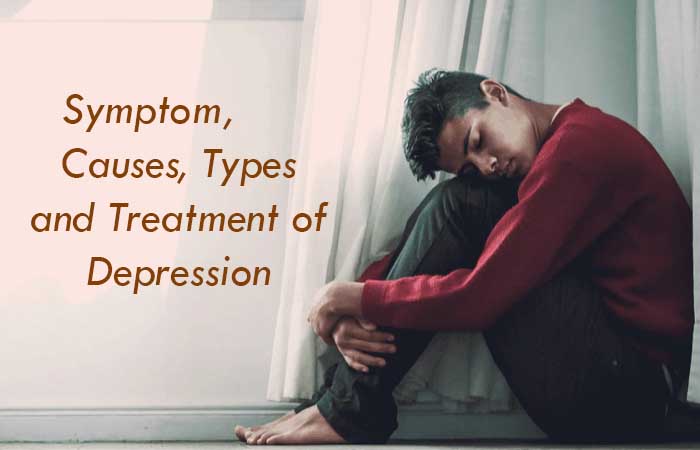Depression is a very common mood disorder. It is experienced by adults and is manifested in different ways. It affects the regular functioning and interrupts with routine life. The patient can get torn away from his composed normal self. Depression induces a lot of negative emotions and thoughts that can engulf the patient. Timely detection and treatment of depression is extremely necessary to bring back the patient back to sanity. It is often regarded as deep sadness and we use the word ‘depress’ quite normally. This is a big myth. Depression is much more than just feelings of sadness.
Symptoms of depression
Depression is greater than our normal emotions of hopelessness or mourning. It has a complex network of symptoms. Some of these stay with time, others just leave and appear as they please. These symptoms can affect either our mind or our body and sometimes both. Symptoms of depression are often experienced differently by people based on their age and gender. These symptoms are based on:
- Behaviour: suicidal thoughts, loss of interest, not feeling pleased by any activity, excessive drinking, easily tired, relying on drugs, withdrawal from social life, avoiding conversations with anyone.
- Mood: irritation, crying, restless, anger, anxiety
- Cognitive effects: poor concentration, unable to focus, delayed responses, inability to complete assigned tasks, impaired speech
- Disrupted sleep patterns
- Physical effects: lack of energy, loss of appetite, problems in digestion, weight loss or gain, unexplained pain and aches, easily fatigued
- Emotional effects: hopeless, empty, sad, incompetence
Causes of depression
Depression is caused because of biological or circumstances. Some of the main causes of depression are:
- If the frontal lobe of the brain is less functional
- History of drug use
- Insomnia, chronic pain, ADHD and other psychological disorders
- Some childhood trauma that keeps on affecting the patient from time to time
- Family history of having a gene with depressive disposition
- Low self- esteem
- Suicidal thoughts
- Certain specific medicines
- Stressful time in life
- History of medical or mental illness
Types of depression
There are many types of depression depending upon the severity of symptoms. Persistent depressive disorder and major depressive disorder are the two primary types.
Persistent depressive disorder
A mild but prolonged form of depression. To confirm its presence, it needs to stick for almost 2 years. It effects can be worse as it stays for longer period of time. The patient has low self- esteem, hopelessness, reduced productivity and loss of interest.
Major depressive disorder
It is more fatal as its symptoms are severe and don’t go away naturally. Out of all the symptoms mentioned above, the patient must show at least 5 of them over a duration of two weeks to be diagnosed for this type of depression. It has many subtypes based on the specified features like melancholic, psychotic, catatonic, anxious etc.
Treatment of depression
Depression can be treated and cured completely in majority cases. The treatment options are:
- Medicines like antidepressants, antipsychotic and antianxiety drugs.
- Psychotherapy where you talk to a therapist to resolve your problems
- Light therapy is used for enabling emotions of brightness and to regulate mood by casting white light on the patient.
- Natural therapy like supplements, essential oils, exercise, vitamins, and plenty sleep can also be used to cure mild cases of depression.
- Avoiding alcohol and drugs, reducing stress, learning to set professional and personal boundaries by saying no at the right time, strong inter-personal and intra-personal relationships can prevent you falling prey to depression.
Can depression be left untreated?
Depression has varied intensity in individuals. Some people experience mild form of depression and others might have higher intensity. The common myth around depression is that it is a mere state of mind which goes away with time and the person becomes normal again. But this is a huge mistake that we commit while assessing psychological disorders. Depression shouldn’t be dismissed as unimportant. Proper diagnosis and treatment should be provided to the patient. If the patient doesn’t get medical or psychological attention, then he spirals into the pit of depression faster and it becomes more problematic to pull him out. If depression is left untreated then it evokes variety of negative responses like:
- Suicidal thoughts
- Alterations in weight (gain or loss)
- Physical problems like extreme pain
- Increased substance abuse
- Panic and anxiety attacks
- Isolation from everyone
- Staying confined to one place (a room)
- Troubled relationships
- Attempts of harming oneself especially physical
Often people feel ashamed about being depressed and they try to treat it on their own. But in reality, it is nothing to be ashamed of and needs to paid attention to. It can be cured easily and quickly when the patient is surrounded by his family and loved ones. It needs a proper treatment and can’t just be cured naturally in confined room of patient’s house. We need to normalise depression and shatter the myths around it being something impure or to be ashamed of. Only then can we fight this disorder, together.

